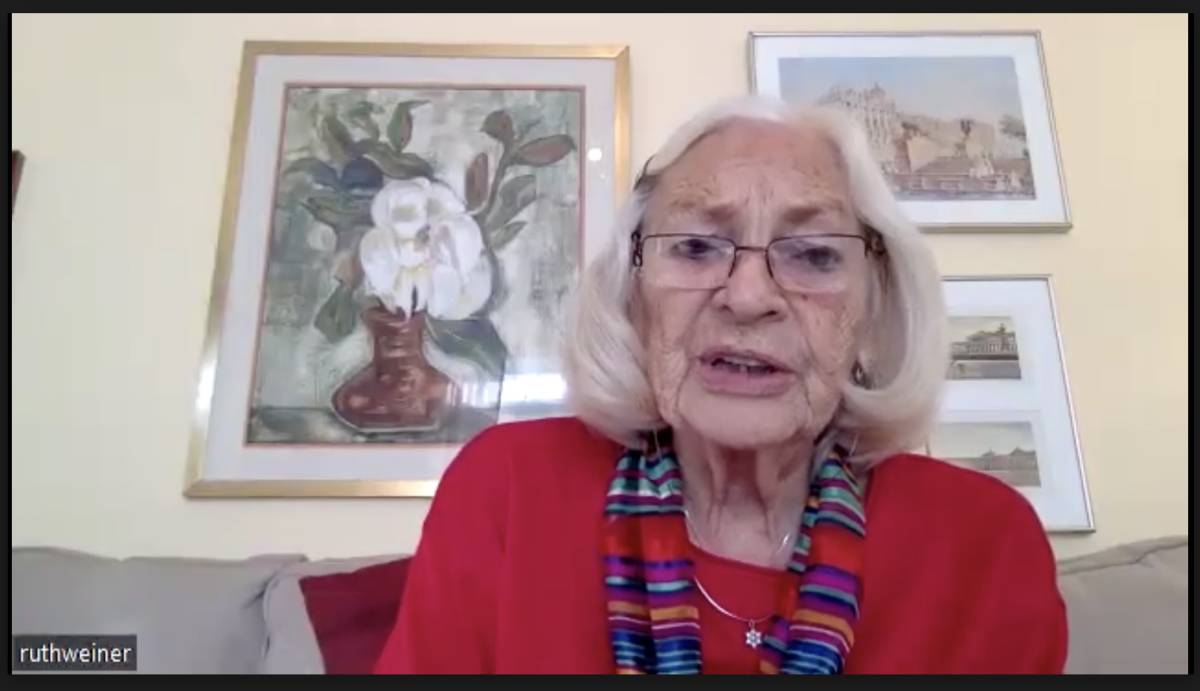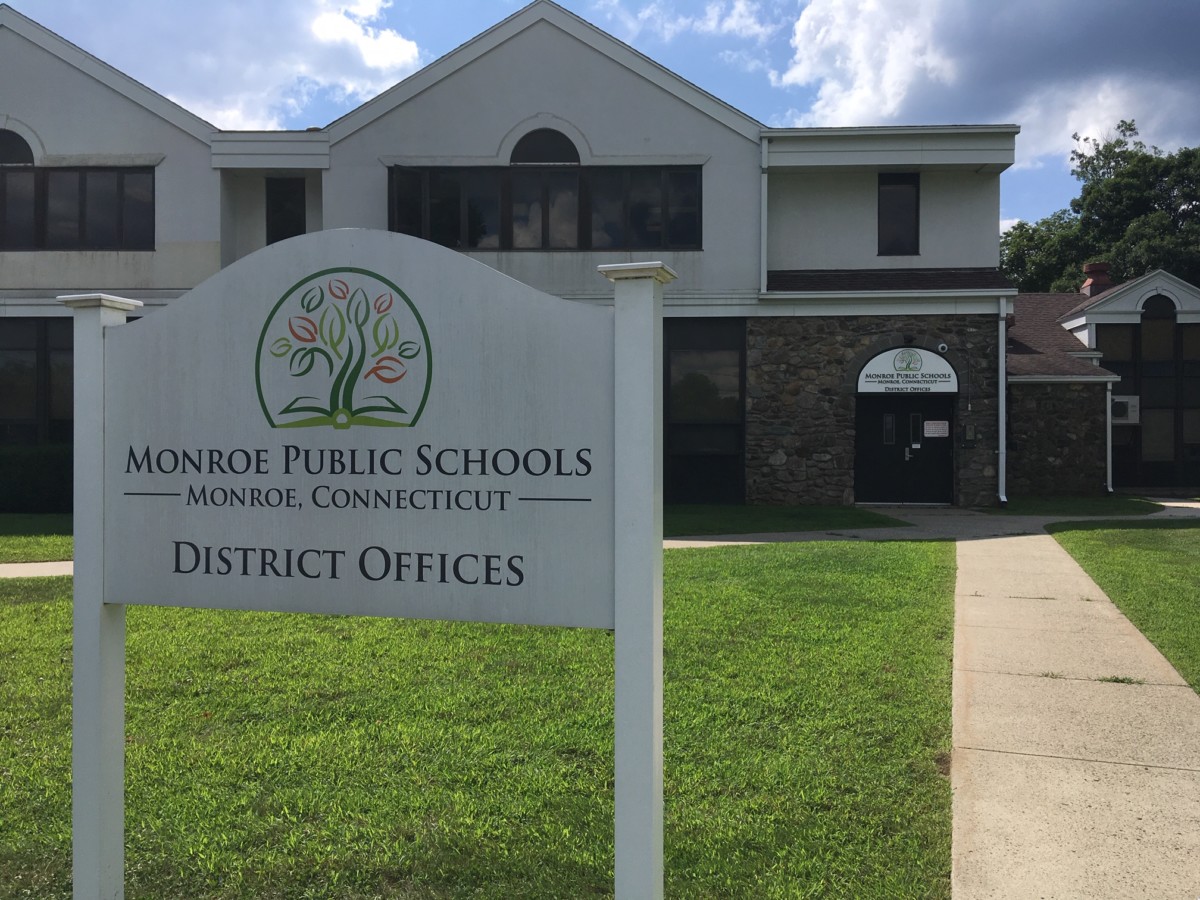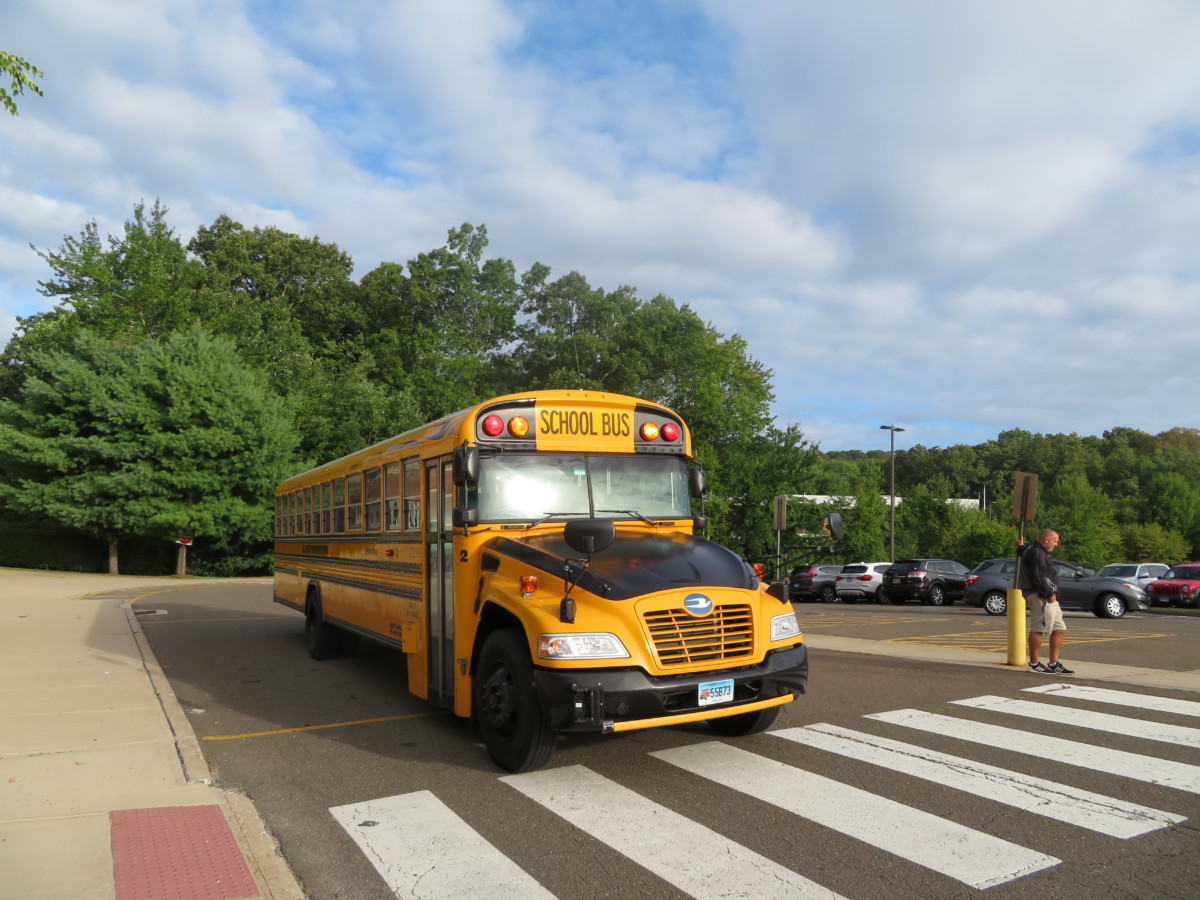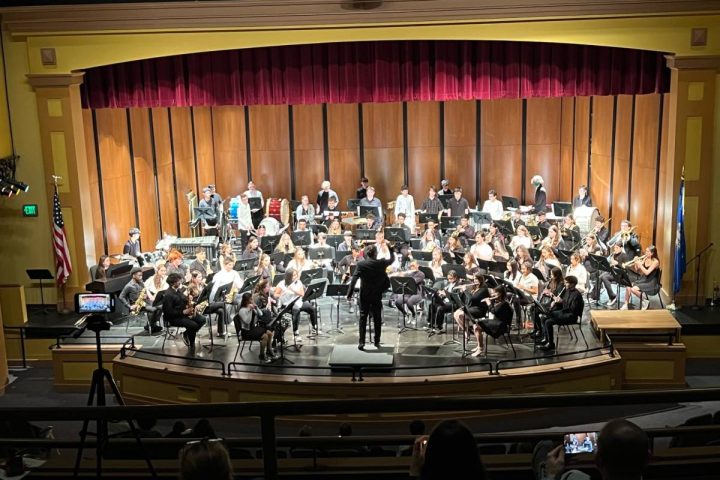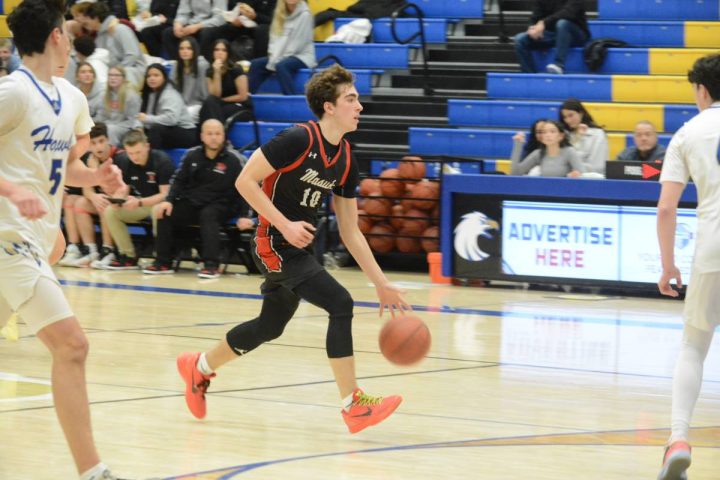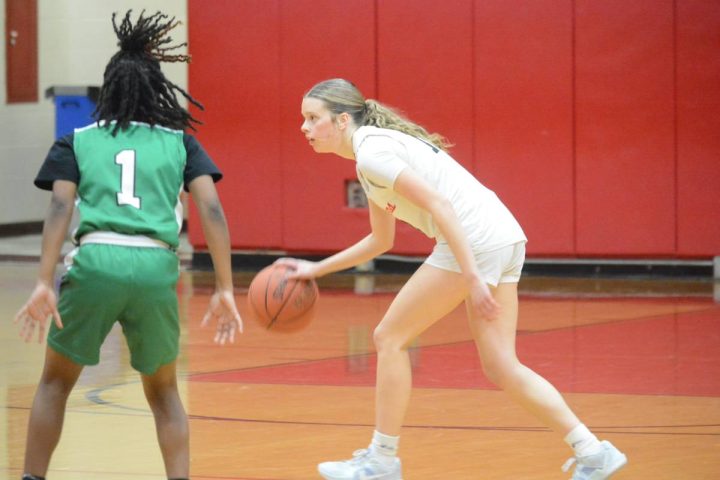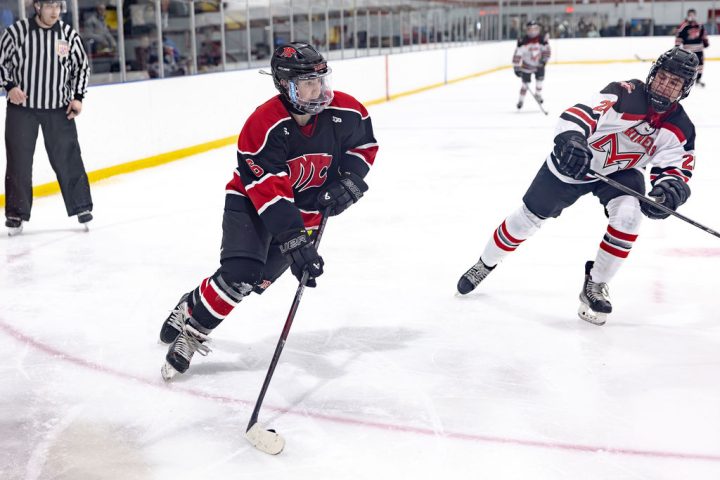Ruth Weiner was a child when she escaped the Holocaust with her mother after Austria fell under Nazis control during World War II. Many family and friends, who survived the Germans’ attempts to exterminate the Jewish people, were scattered around the globe after the war. While the Weiners were reunited with some relatives, others were never seen again.
Weiner, 93, recently spoke to all of Jockey Hollow Middle School’s seventh graders, including its STEM Academy students who watched the livestream video from the Masuk High School auditorium, sharing the story of her perilous journey to England, then to the United States, and answering their questions.
“I just want to say upfront, that there’s nothing special about my story,” she said. “There really isn’t. There are as many stories as there are people whose lives were disrupted by the Holocaust — and that’s people who survived and six million who died.”
Jamie Sherry, the secondary instructional leader for history and social studies, arranged the event with Weiner, who has visited Jockey Hollow several times. Prior to the event, students read the book, “Refugee” by Alan Gratz.
“Refugee” follows the stories of Josef, a Jewish boy whose family tries to escape 1930s Nazi Germany with the threat of going to a concentration camp looming; of Isabel, a Cuban girl rafting with her family to the U.S. in 1994 to flee from riots and unrest in their country; and of Mahmoud, a Syrian boy whose family heads for Europe in 2015 when their homeland is torn apart by violence and destruction.
“I think you know from studying the story of Josef, that being Jewish is something kind of complicated,” Weiner said. “It is a religion. It’s an ethnicity. It is a nationality of late, in some people’s minds at least. It is not, and I emphasize that, it is not a race, which is something that the Nazis tried to put forward. It’s a very complicated state of being.”
“If you really want to see diversity, Jewish people, they come in all sizes, shapes and colors,” she said. “Yes, there are Black Jews. There are brown Jews. There are Jews that speak every language in the world.”
Weiner emphasized the seriousness of the word “holocaust,” recalling a TV news report when a Weston family fried a turkey in their garage one Thanksgiving and it caught fire, burning down the garage and mansion.
The news report described the event as “a turkey holocaust.”
“No, it was not a turkey holocaust,” Weiner said. “Holocaust should be saved for what Hitler did to the Jews in the 1930s that wiped out one third of the Jewish people in the world.”
She told students the Holocaust was based on pure hate and pure prejudice.
“It was somebody saying that another human being was worthless, and if they’re worthless, it’s okay to kill them,” Weiner explained. “Well human beings aren’t worthless and it’s never okay to kill another human being.”
She said the Holocaust was committed by the Nazis, a political party of national socialists, as the rest of the world looked on.
“I’m going to tell you the story of one person and how it impacted that one person,” Weiner said of her own personal experience.
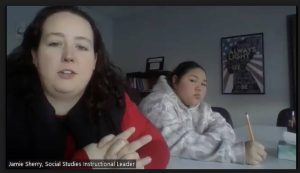
One student asked Weiner why she felt compelled to share her story.
“It was awful. I went through it and came out of it. I have an obligation,” Weiner said. “I’m very fortunate. I have a wonderful family, which is a huge blessing. You also have an obligation to pass it on — to try to share some of that may be useful.”
Weiner expressed her belief that people are capable of positive change and encouraged students to be that beacon of light for others whenever change is needed.
“I can tell that every single one of you is capable of saying to themselves, ‘this is not the way things should be.'” she said. “You have great power. You just need to use it.”
A lost childhood
Weiner was born into a professional family in Vienna, the capital city of Austria.
“Vienna is a very old city,” she said. “My grandfather’s factory is still standing and the building is still in use, and it looks lovely. There is a beautiful sign on it that says ‘1735,’ the year the building was dedicated. There are lots of buildings in Vienna that are that old.”
Weiner said the city had a lot of apartment houses, palaces, theaters with operas, beautiful parks and wide streets. “Just picture that, anything anybody could want,” she said.
She said parents were strict back then. “Children learned to say please and thank you before saying mommy and daddy — and you had better say it too, because it was just expected of you,” Weiner explained.
“I went to the same elementary school that my mother did, and it was a lovely school and I had a lovely teacher, and we had music and we had art,” Weiner said, adding, “and those were the things that I really loved.”
But all of that was wiped away.
Weiner said a turbulent period after World War I broke up the Austro-Hungarian Empire, which had dominated all of Europe. “They lost their emperor. They lost the war,” she said. “They were suddenly a differently organized country and things were really rough for a long time.”
She said that was one factor enabling Adolf Hitler, the ruthless dictator of Nazi Germany, to succeed in the Anschluss or annexation of Germany and Austria.
“The moment Hitler marched in, and I think most survivors would tell you the same thing, your childhood flew out the window, because you had to learn to survive in very dangerous settings and you had to learn to be very smart about things that normally aren’t part of kids’ lives,” Weiner said. “That’s exactly what happened to me.”
Swastikas symbolizing hate
Weiner said the takeover of Austria was swift. It began with the marching of thousands of German troops and with uniformed SS using various city squares for rallies with political speakers.
“All of a sudden, out of nowhere buildings were covered with red bunting and a swastika,” she said of the Nazis symbol. “I’d never seen one before. It’s a Hindu symbol for love, history of different places. It was quite innocuous. The Germans thought this would be a perfect symbol for Aryans.”
“The Germans deduced they were a party of the perfect Aryan race. There is none,” she explained.
“If you don’t know what a swastika is, please ask your teacher to draw one on the board for you,” Weiner said. “I want every one of you to know what it looks like. And why do I want you to know it? Because there are people out there who are knuckleheads. They’re not terrible people. They’re dummies. They’re knuckleheads. They’re stupid, and I’m sorry if I’m insulting anybody, who think it’s really cool to get out there and draw swastikas on things.”
“I strongly suspect that if they knew what they were doing, they wouldn’t do it,” she said. “They wouldn’t want to do something as stupid as that.”
“That swastika became the symbol of everything that the Nazis did to destroy people, to destroy countries, to ultimately destroy their own country — and that is not something that you want to be associated with in any way,” Weiner said.
Weiner said she was living in a city full of swastikas, adding some people pinned the symbol to their clothing.
“In our school that was the first sign I had that something was happening,” she said. “Almost the first week of school, our project was to make Nazis flags, and my Nazis flag was considered one of the nicest ones. It was put up in front of the class and at that point nobody really cared that it was done by a Jewish student.”
‘A Jewish pig’
Weiner said her teacher liked her, because she came to first grade already knowing how to read and was always happy to help her classmates.
“But something happened that made it very clear to me what was going on,” she said.
Weiner’s close friend, Kitty, had broken her arm and the cast held it straight out, so the girl couldn’t put her coat on and take it off by herself, hold her books or write.
“Our teacher assigned me to be her helper,” Weiner said. “One morning, she came to class and I went to help her with her coat and Kitty spit in my face. It was shocking. I asked why she did it and she says to me, ‘it’s because you’re a Jewish pig.’ And I did what you would expect a first grader to do, which is I started to cry and, it’s kind of weird, but I could still feel to this day what that felt like and the realization that something tremendous had changed.”
“I went home and my parents explained to me that her father had probably joined the Nazis party and had told her that she was not to be associated with any Jewish kids,” Weiner said.
Dangerous streets
It became common to see men wearing uniforms in the streets of Vienna, from the SS to members of the Gestapo.
“The streets were full of people whose only mission in life was to destroy you,” Weiner said. “People had different uniforms and you had to know who they were, because they could be dangerous to you. It became a living hell for anybody who was Jewish or for anybody who was on the Nazis’ list for destruction. There were others, handicapped, gypsies …”
“A lot of things changed in our lives,” she said. “My father was arrested and put in a Viennese jail and we celebrated it. Most people don’t celebrate when somebody goes to jail. He arrested because he was politically active and they were arresting everybody who had been part of that particular party.”
The Weiners were grateful he was arrested, because a lawyer in his political party, who was not Jewish, became a Nazis and threw his weight around to make sure Weiner’s father was not sent to a concentration camp.
“He said, ‘whatever you do, you do not send this Jew off to the concentration camps,'” Weiner said, while recalling how all Jews arrested at that time were sent directly to concentration camps. “He said, ‘I need this Jew for trial. He’s my star witness’ and ‘don’t you dare send him off.'”
Any Jew who resisted being arrested in the street risked being beaten or shot, according to Weiner, who said Jewish stores were vandalized and looted and Jewish children were no longer allowed to go to the public schools.
“When I got kicked out of the regular public elementary school, I had to go to a Jewish school,” Weiner said. “Vienna is a large city and we had trolley cars. My best friend and I had to take a trolley car all the way to the other end of town, change to a second trolley car and walk several blocks every day. In second grade, nobody would ever make you do that and we didn’t have a car.”
Burning books
In 1938, November 9 and 10 became known as Kristallnacht (The Night of Broken Glass) in Germany. Shattered glass littered the streets after the vandalism and destruction of Jewish-owned businesses, synagogues, and homes.
“Let me tell you my Kristallnacht story,” Weiner said of her experience in Austria. “It was a very gray day on November 10, 1938 and we had a feeling something was wrong. We did not know there had already been a huge attack the night before. It didn’t happen yet in Vienna.”
While going to school that morning, Weiner and her friend saw “way more” uniforms in the street than they normally did and a few stores in the neighborhood had already been vandalized, which “unfortunately was not a big deal.”
“A booming voice said, “we know you’re in there. We saw you, so if you know what’s good for you, you’re going to open this door.” — the Gestapo surrounds Weiner’s home
“When we got on our second trolley car we began to see the mayhem happening and by the time we got off our trolley car to walk to school, we saw something which has stayed with me ever since that time,” Weiner said.
Books from Jewish bookstores were piled up and being set on fire.
“When I grew up, books were sacred,” Weiner said. “You washed your hands. Watching them burning was very disturbing. When we got to school a bunch of hoodlums were picking cobblestones up off the street and throwing them at our school.”
Children in the Jewish school sat on the far side of the room, safely away from the windows as rocks crashed through the glass.
“The shouting was terrible and the rocks never stopped, so they started dismissing us two-by-two out the back door,” Weiner said. “We made our way through all this, past the book piles that were flaming all over, to our trolley car.”
Surrounded by Gestapo
When Weiner got home, she and her mother left to check on her grandparents to make sure they were safe, before walking back to their house.
“The Gestapo, who were the secret police, didn’t have a uniform. You weren’t supposed to know who they were,” Weiner said. “But they thought they were hot stuff. If they could afford it, they would buy leather coats with a belt, and if they couldn’t, they would buy a raincoat with a belt and a fancy fedora hat. If you saw somebody with a belted raincoat and a fedora hat, you knew they were Gestapo.”
As they got to their building, Weiner and her mother noticed two Gestapo members leaning against a building across the way, watching them closely.
“This was not good news,” she said. “We moved as quickly as we could to our apartment and sat in our living room. There began this unearthly banging on the door, a horrible noise.”
A booming voice said, “we know you’re in there. We saw you, so if you know what’s good for you, you’re going to open this door.”
“My mother was not about to do this,” Weiner said. “We heard banging, banging, banging and then footsteps. And a few minutes later, banging, banging, banging and footsteps. And this went on for two, three, four, five hours.”
By 7 p.m., it had gotten dark and Weiner and mother could not get anything to eat or drink.
“We could not use the bathroom,” Weiner said, “and what made it worse was, through this whole time, the telephone kept ringing. It was a wall telephone. My mother was not about to go answer it, because that would have totally given her away.”
Finally, by 9 p.m. they heard the footsteps go away, so when the phone rang, Weiner’s mother took a chance.
“She let it ring a couple times and just took the receiver, put it to her ear, and said nothing,” Weiner said. “A voice on the other end said, ‘say nothing. I know you’ve got the Gestapo at your door. They will go away, and when they do, I want you to be ready in your coat and I want your daughter to have her coat, as I am going to take you out.'”
“It was the lawyer, who was my father’s friend, who found it in him to risk his life, because that’s what he was doing, to come and get us,” Weiner said, “and that’s exactly what he did.”
The lawyer pinned his wife’s swastika to Weiner’s mother and his little girl’s swastika on Weiner.
“We walked through the streets as if we were having a lovely little evening stroll,” she recalled, “and there were still some fires burning and there was still glass on the street, so it was bizarre. He took us home to his house and nobody stopped us. He fed us something and I finished the night in bed with his little girl. This was such a special thing he did. He risked his life.”
The scariest thing
During the question and answer period, one student asked Weiner what was the scariest thing that ever happened to her or her family under Nazis control.
Weiner’s mother had tried to get them out of the country for a long time and they were finally able to secure travel to England through Kindertransport.
“When we left, it was my mother and her younger sister, who had a year old baby, and me — and absolutely everything we owned,” Weiner said. “My mother, aunt and I were going to be housemaids, and we would all be separated when we got to England. It was not a happy trip.”
“We had everything we owned in suitcases and this very husky one-year-old, who I was in charge of, because the two women were in charge of the suitcases and the papers,” Weiner said.
The family was traveling through Aachen, a border town with Belgium, in the evening.
“They took all the Jews on the train and locked them in a glass kiosk, which at the time was a store,” Weiner said. “We had to sit on the floor and were there all night.”
The guards changed shifts at 5 a.m., and Weiner said some mean guards came on duty.
“My mother and I had to use the restroom very badly,” she said. “One guard took pity and allowed us to go out, but without our papers and we had to get back in five minutes.”
Weiner said she had heard shooting before, Nazis had come to their apartment, but this was the most terrified she ever was, because she and her mother had to find the facilities, make their way back, then hope the guards let them back in.
“They were going through luggage and beating men up,” she said. “We didn’t know about the town we were in or where the next train was going.”
A student asked what it was like talking to a Nazis officer.
“The aunt and baby were blue eyed, had blonde hair and were very pretty,” Weiner said. “I was not blonde and blue eyed and very pretty, but I had light brown hair and green eyes, so I could sort of pass, but I was very skinny.”
“A couple of very high ranking officers came up to us and said it’s so wonderful to see beautiful Aryan children, and they started flirting with my aunt and they pinched my little cousin, who had big old chubby cheeks, and they pinched my cheeks, which were neither big nor chubby,” she said with grin.
The officers started talking to Weiner, asking if she was going to be a “Hitler girl.”
“I was terrified on that one too,” she said, “but yes, I had a lovely conversation with a German officer.”
The Holocaust never ended
Another student asked how Weiner felt when the Holocaust ended and she started her life over.
“The Holocaust never really ended,” she said. “What ended was a particular phase of it. It had such a big impact on the people who were touched by it. For the third generation, the grandchildren of those in the Holocaust who survived, it’s still a big impact. It’s part of your family history.”
Rather than an end, Weiner said there is just movement to another stage in life.
“I still mourn the relatives who were killed,” she said. “It isn’t every day. It doesn’t impede my life, but is the pain there? Yes, and I think most people will tell you that.”
A student asked Weiner if she was able to reconnect with friends and family after the war ended?
“It worked both ways,” she said. “There were those who were lost even though they weren’t killed, because I have family in Australia. I’ve never been to Australia and I don’t think I ever will be. We have family in countries all over the world.”
“We’ve been lucky and we’ve been able to get together with most of them,” Weiner said. “My parents were not able to. Two brothers, who were permanently separated, wound up corresponding for the rest of their lives.”
“There was a flip side to that too,” she said, “where there were people you never thought you’d see again, you thought they were in concentration camps and were going to be killed, but you were reunited with them afterwards, and that was very sweet and very precious and you reestablished your lives.”
Coming to America
Weiner was asked about coming to American and adjusting to a new country.
“That was extremely tough and I think it’s something that segues very well into your book, because it was your goal, what you longed for through all the tough stuff, and suddenly you were here,” she said.
Weiner said she had been living in England during a full blow war with air raids and was among the children learning how to identify Germans’ war planes.
“I can to this day, because the kids in school learned it and they used kids for that and all kinds of things,” she said of identifying war planes, “and then you come to America, where the biggest thing is bubblegum was just invented.”
“It was a big orientation among the kids I had been friendly with, and boy I was a big misfit,” Weiner said. “I adjusted eventually.”
Hitler’s voice
A student asked Weiner if she thinks about the Holocaust often and how it affects her life now. Because she makes appearances to talk about the Holocaust, she said she thinks about it a lot and tries to address every group from where they are.
“When you get older, it’s an ordinary natural thing to think about different parts of your life and you think about the people who came before you,” Weiner said. “Some ask, ‘what do you think your life would be like if there wasn’t a Holocaust and you had just grown up in Vienna?’ I don’t know. It didn’t happen. But it stays very much a part of your life.”
A student asked Weiner if she ever met Hitler.
“Actually I heard him,” she said. “I could have seen him very easily. When they first invaded, there were these rallies with people speaking, and he loved to do that. He loved to come to Vienna. He loved to have a bunch of people there cheering for him. There were these rallies and, if you were Jewish, you wouldn’t go anywhere near them.”
“You heard him on the radio,” she said. “He had a kind of whiny, screechy voice. He was a real demagogue and demagogues have a certain way of addressing their public, and he mastered it to a ‘T’. He yelled. He was very dramatic. He made faces. On the radio, he had this screechy voice, which I didn’t like. But I heard him several times.”
Always welcome
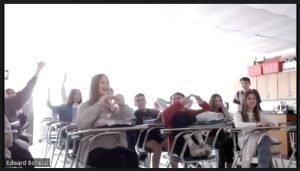 Weiner, who has spoken to Jockey Hollow students every year for four years, was greeted by students waving, smiling and making heart symbols with their hands. She said she feels like they are family.
Weiner, who has spoken to Jockey Hollow students every year for four years, was greeted by students waving, smiling and making heart symbols with their hands. She said she feels like they are family.
“For a group of seventh graders, these questions are so mature,” Weiner said. “They’re so considered. They’re so smart and above all what has impressed me is they show sympathy, they show empathy, they show caring and those are qualities that people your age should be very proud of for having them be part of your character.”
“Ruth, we are so blessed and so thankful to have you speak to us today,” Sherry said at the end of the presentation. “Your story is so powerful and I know that our students are better, because they have heard your story, and they now can be the change that you want them to be.”
All respectful comments with the commenter’s first and last name are welcome.

